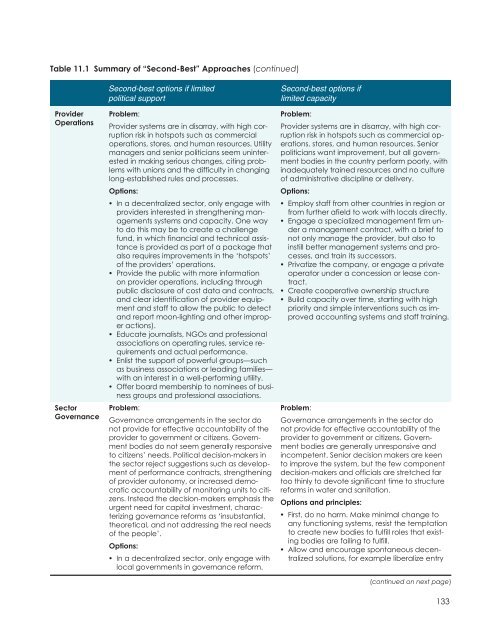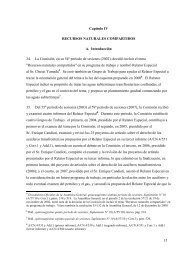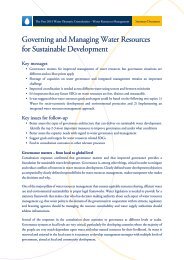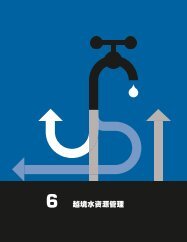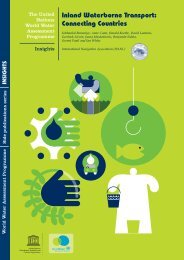A Sourcebook - UN-Water
A Sourcebook - UN-Water
A Sourcebook - UN-Water
Create successful ePaper yourself
Turn your PDF publications into a flip-book with our unique Google optimized e-Paper software.
Table 11.1 Summary of “Second-Best” Approaches (continued)<br />
Second-best options if limited<br />
political support<br />
Second-best options if<br />
limited capacity<br />
Provider<br />
Operations<br />
Sector<br />
Governance<br />
Problem:<br />
Provider systems are in disarray, with high corruption<br />
risk in hotspots such as commercial<br />
operations, stores, and human resources. Utility<br />
managers and senior politicians seem uninterested<br />
in making serious changes, citing problems<br />
with unions and the difficulty in changing<br />
long-established rules and processes.<br />
Options:<br />
Problem:<br />
Governance arrangements in the sector do<br />
not provide for effective accountability of the<br />
provider to government or citizens. Government<br />
bodies do not seem generally responsive<br />
to citizens’ needs. Political decision-makers in<br />
the sector reject suggestions such as development<br />
of performance contracts, strengthening<br />
of provider autonomy, or increased democratic<br />
accountability of monitoring units to citizens.<br />
Instead the decision-makers emphasis the<br />
urgent need for capital investment, characterizing<br />
governance reforms as ‘insubstantial,<br />
theoretical, and not addressing the real needs<br />
of the people’.<br />
Options:<br />
• In a decentralized sector, only engage with<br />
local governments in governance reform.<br />
Problem:<br />
Provider systems are in disarray, with high corruption<br />
risk in hotspots such as commercial operations,<br />
stores, and human resources. Senior<br />
politicians want improvement, but all government<br />
bodies in the country perform poorly, with<br />
inadequately trained resources and no culture<br />
of administrative discipline or delivery.<br />
Options:<br />
• In a decentralized sector, only engage with • Employ staff from other countries in region or<br />
providers interested in strengthening managements<br />
systems and capacity. One way • Engage a specialized management firm un-<br />
from further afield to work with locals directly.<br />
to do this may be to create a challenge der a management contract, with a brief to<br />
fund, in which financial and technical assistance<br />
is provided as part of a package that instill better management systems and pro-<br />
not only manage the provider, but also to<br />
also requires improvements in the ‘hotspots’ cesses, and train its successors.<br />
of the providers’ operations.<br />
• Privatize the company, or engage a private<br />
• Provide the public with more information operator under a concession or lease contract.<br />
on provider operations, including through<br />
public disclosure of cost data and contracts, • Create cooperative ownership structure<br />
and clear identification of provider equipment<br />
and staff to allow the public to detect priority and simple interventions such as im-<br />
• Build capacity over time, starting with high<br />
and report moon-lighting and other improper<br />
actions).<br />
proved accounting systems and staff training.<br />
• Educate journalists, NGOs and professional<br />
associations on operating rules, service requirements<br />
and actual performance.<br />
• Enlist the support of powerful groups—such<br />
as business associations or leading families—<br />
with an interest in a well-performing utility.<br />
• Offer board membership to nominees of business<br />
groups and professional associations.<br />
Problem:<br />
Governance arrangements in the sector do<br />
not provide for effective accountability of the<br />
provider to government or citizens. Government<br />
bodies are generally unresponsive and<br />
incompetent. Senior decision makers are keen<br />
to improve the system, but the few component<br />
decision-makers and officials are stretched far<br />
too thinly to devote significant time to structure<br />
reforms in water and sanitation.<br />
Options and principles:<br />
• First, do no harm. Make minimal change to<br />
any functioning systems, resist the temptation<br />
to create new bodies to fulfill roles that existing<br />
bodies are failing to fulfill.<br />
• Allow and encourage spontaneous decentralized<br />
solutions, for example liberalize entry<br />
(continued on next page)<br />
133


